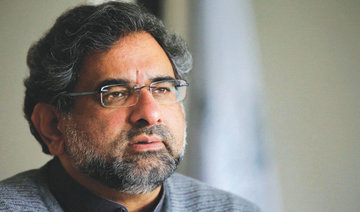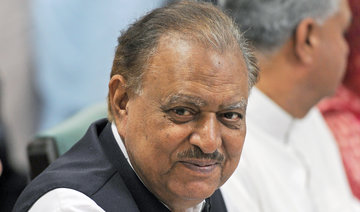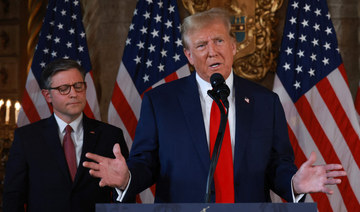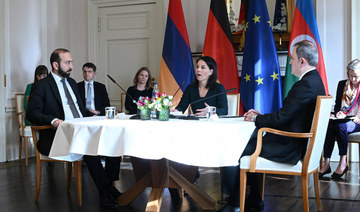ISLAMABAD: Pakistan extended a tax amnesty scheme on Sunday till July 31, allowing people to declare their hidden domestic and offshore assets by paying a nominal 2 to 5 percent tax on them.
The scheme was originally launched by the previous government on April 10 and was scheduled to expire on June 30.
“The Federal Cabinet, on the recommendations of the Finance Minister, has approved an extension of the closing date of tax amnesty schemes for declaration of foreign assets and domestic income and assets till July 31, 2018,” Dr. Mohammed Iqbal, member (inland revenue-policy) of the Federal Board of Revenue (FBR), told Arab News.
A summary was approved on Saturday for promulgation of a presidential ordinance to amend the Foreign Assets (Declaration and Repatriation) Act 2018, and the Voluntary Declaration of Domestic Assets Act to extend the amnesty schemes for offshore and domestic assets.
President Mamnoon Hussain promulgated the ordinance to validate the one-month extension with immediate effect.
He said the extension was made on the request of trade bodies, professional associations and the public since “there has been an overwhelming demand and response which is on the rise.
“The extension was also needed to remove ambiguities through clarifications and explanations required to provide certainty to the general public and to ensure effective implementation of the schemes,” he said.
Iqbal said the scheme had also been extended for a month as those declaring foreign assets faced problems in the payment of tax on foreign assets and repatriation of liquid assets.
“It will help the government in bringing undocumented persons, assets and income into the documented sector,” he said. “Depending on the flows, the scheme has the potential to bring in macroeconomic and fiscal stability in the economy.”
Ex-premier Shahid Khaqan Abbasi claimed at the launch of the amnesty scheme in April that it would broaden the tax base from only 1.2 million individuals to 30 million.
The FBR expected to collect around RS120 billion ($32 billion) in tax contributions from those who have used the amnesty scheme. However, by late Saturday night, only RS75 billion could come in the FBR’s kitty.
Pakistanis were allowed to whiten their hidden local and foreign assets at nominal rates between 2 and 5 percent, depending on whether they are declaring domestic or foreign assets and repatriating these possessions to the country or not.
Economists welcome the extension in the amnesty scheme but also urge the authorities to formulate cogent policies to increase the tax net and catch tax evaders to strengthen the country’s economy.
Dr Ashfaque Hasan Khan, senior economist and ex-adviser to the Ministry of Finance, said the scheme had been successful only because the Supreme Court gave it the go-ahead after properly vetting and reviewing its contours.
“The Supreme Court’s approval helped improve confidence of businessmen and the general public in the amnesty scheme and hopefully the FBR will get sufficient revenue through it,” he told Arab News.
Khan said that if Pakistanis declared their foreign assets through the scheme in large numbers, it would also help improve the country's foreign exchange reserves. “For the first time, businessmen and trade bodies have been taking a lot of interest in the amnesty scheme and this shows its success,” he added.
The apex court had taken notice of the amnesty scheme after the then opposition parties had disapproved of it, but later, in June this year, the court approved it after getting it reviewed by economists and tax experts.
Dr. Athar Ahmed, senior economist, termed the tax amnesty scheme a “blessing in disguise” and said the government had no other option but to announce the amnesty to bring more people into the tax net.
“The authorities had to offer incentives to tax evaders because there was no mechanism in place to hold them accountable for their undeclared local and foreign assets,” he told Arab News.
He urged the government to sign agreements with international bodies and other countries to track down undeclared assets of Pakistanis. “Parliament should enact laws to help relevant authorities locate undeclared local and foreign assets of Pakistanis to strengthen the economy,” he suggested.
Pakistan extends tax amnesty scheme for another 30 days
Pakistan extends tax amnesty scheme for another 30 days
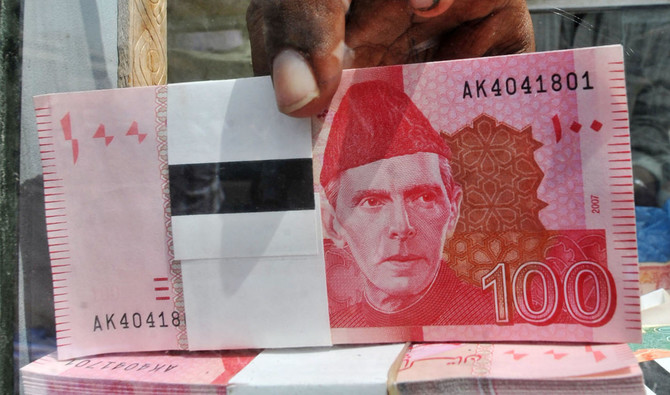
- Country expects the plan to broaden the tax base from current 1.2 million individuals to 30 million
- The government extended the scheme on Sunday till July 31, allowing people to declare their hidden domestic and offshore assets by paying a nominal tax on them
DR Congo faces ‘catastrophe’ from floods: UN
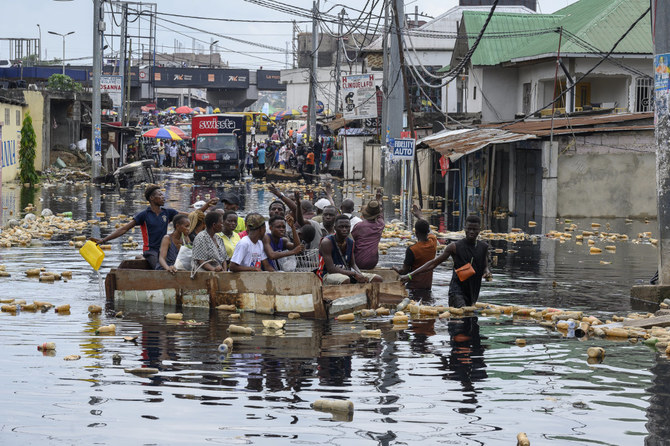
- The UN body voiced concern at the effect on health service provisions as sickness hit affected areas of the country
- Locals were reporting seeing hippos, crocodiles and snakes in flooded inhabited areas, risking fatal attacks, especially on children and livestock
KINSHASA: Eastern DR Congo faces a “humanitarian catastrophe” after being hit by severe flooding affecting about half a million people, the UN World Food Programme said Wednesday.
“Heavier rainfall than usual during the rainy season, prompted by climate change, has forced rivers and lakes to overflow, swallowing towns, villages and roads on the shores,” the WFP said in a report citing “chaos” in South Kivu and Tanganyika provinces.
Worst-affected are Haut-Lomami and Tanganyika provinces, which border the lake of the same name as well as neighboring Burundi, Tanzania and Zambia.
“All around Lake Tanganyika, and areas upstream of the Congo River basin, people have lost their homes, their fields and livelihoods,” the WFP reported, estimating 471,000 people were affected with 451,000 hectares (1.1 million acres) flooded, including 21,000 hectares of cropland.
“People in flooded areas need food, shelter, clean drinking water, health and sanitation support, as well as support to restart their livelihoods.
“However, WFP has very limited resources to respond to the flooding crisis due to current funding levels and the food assistance pipeline situation.”Democratic Republic of Congo (DRC).
“With towns and villages swallowed in the lakes and rivers, diseases are rife. Latrines have overflowed into the water that surrounds people’s homes and sanitation is poor.
“People are forced to wade through and wash their clothes and cooking implements in cholera-riddled water,” said the report, warning of “a whole host of animal-borne diseases.”
Locals were reporting seeing hippos, crocodiles and snakes in flooded inhabited areas, risking fatal attacks, especially on children and livestock.
Amid lost harvests, “people are struggling to feed their families which is leading to more people arriving in health care facilities with symptoms related to months of poor food intake. Especially children are at risk of developing malnutrition.”
Flooding has hit vast swathes of Africa in recent weeks, which have notably claimed 257 lives in Kenya, according to a latest toll Wednesday.
US House quickly defeats Republican hardliners’ effort to oust Speaker Johnson

- Democrats joined Republicans in a 359-43 vote to protect Johnson’s speakership to avoid a replay of the chaos that occurred in October
- Hakeem Jeffries, the House's Democratic Party leader, said he hoped to see House Republicans turn against party hard-liners
WASHINGTON: The US House of Representatives on Wednesday swiftly and overwhelmingly defeated an effort by firebrand Republican Marjorie Taylor Greene to remove Speaker Mike Johnson, a fellow Republican, from his leadership role.
Democrats joined Republicans in a 359-43 vote to protect Johnson’s speakership, in a bid to avoid a replay of the chaos that occurred in October when Republicans ousted his predecessor, Kevin McCarthy.
Greene’s move represented a rare Republican defiance of presidential candidate Donald Trump, who in a social media post following the House vote on Wednesday, said it was “not the time” for Republicans to try to push out their own speaker.
Greene’s measure, known as a motion to vacate, showcased the disorder that has marked Republicans’ slim 217-213 House majority, particularly since it had been clear that the effort would fail given Democrats’ opposition.
“I appreciate the show of confidence from my colleagues to defeat this misguided effort,” Johnson, 52, said following the vote. “Hopefully this is the end of the character assassination that has characterized the current Congress.”

Multiple Republicans criticized Greene’s move, including centrist Representative Marc Molinaro.
“This is not an individual who knows how to lead,” Molinaro said of Greene. “She’s not an individual who knows how to negotiate. And she certainly doesn’t seem to have any concern for the stability of the Congress or the people we represent.”
Greene stood flanked by fellow Republican Thomas Massie when she made her move against Johnson, criticizing him for a string of compromises with Democrats, who hold a majority in the Senate.
“Excuses like ‘this is just how you have to govern in divided government’ are pathetic, weak and unacceptable,” Greene said of Johnson. “Even with our razor-thin Republican majority we could have at least secured the border.”
Taunts and jeers
The chamber erupted in taunts and cheers at points as Greene read her resolution, with Democrats at times chanting “Hakeem, Hakeem,” a reference to their party leader, Hakeem Jeffries, in an echo of the many times they voted for him as speaker during Republicans’ multiple rounds of voting for speaker since the current House was seated in January 2021.
Johnson has angered many hard-liners by enacting bipartisan spending measures to avoid government shutdowns and aid US allies including Ukraine, without insisting on strict security measures for the US-Mexico border that Democrats reject.
The House Republicans’ border security bill had no chance of passing the Democratic-controlled Senate.

A bipartisan compromise bill negotiated late last year and early this year in the Senate, with the Biden administration’s approval, was killed by House and Senate Republicans at Trump’s behest.
Johnson could be seen walking around the House floor after Greene began her call on Wednesday for his ouster, with Republican supporters shaking his hand and patting him on the back.
“Republicans have to be fighting the Radical Left Democrats, and all the Damage they have done to our Country,” Trump said in his Wednesday post. “We’re not in a position of voting on a Motion to Vacate. At some point, we may very well be, but this is not the time.”
The situation has bolstered Jeffries, who agreed to save Johnson from ouster after freeing Congress from the road block of Republican infighting by delivering crucial Democratic support for must-pass bills.
Greene in remarks to reporters after the vote did not rule out trying to oust Johnson again.
For his part, Jeffries said he hoped to see House Republicans turn against party hard-liners, saying, “The only thing we ask of our House Republican colleagues is for traditional Republicans to further isolate the extreme MAGA Republican wing of the GOP, which has visited nothing but chaos and dysfunction on the American people.”
Britain and NATO allies must spend more, be tougher, UK’s Cameron to say
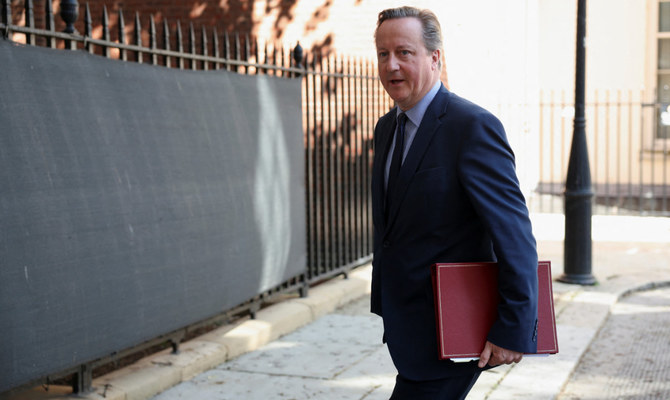
- The upcoming NATO summit must see all allies on track to deliver their pledge made in Wales in 2014 to spend 2 percent on defense
LONDON: Britain’s foreign minister, David Cameron, will urge its fellow NATO members to meet their pledge to spend 2 percent of GDP on defense, and to be tougher and more assertive with adversaries, in a speech to be delivered on Thursday.
In what is billed as his first major pronouncement as foreign secretary, Cameron will say NATO must “out-compete, out-cooperate and out-innovate,” and that Britain must not only bolster existing alliances but also forge new partnerships around the globe.
“We are in a battle of wills. We all must prove our adversaries wrong – Britain, and our allies and partners around the world,” Cameron will say at the UK’s National Cyber Security Center, according to extracts released by his office.
“The upcoming NATO summit must see all allies on track to deliver their pledge made in Wales in 2014 to spend 2 percent on defense. And we then need to move quickly to establish 2.5 percent as the new benchmark for all NATO allies.” Last month, Prime Minister Rishi Sunak said British defense spending would increase to 2.5 percent of GDP by 2030 — an additional 75 billion pounds ($94 billion) over the next six years.
Britain has been one of the most vocal and active backers of Ukraine in the wake of the invasion by Russia, and Cameron, a former prime minister, will say too nations are not learning the lessons of that conflict.
Some in Europe seem unwilling to spend on defense while war rages nearby, Cameron will say, adding that while some nations have criticized attacks on shipping in the Red Sea, only Britain and the United States have carried out strikes in retaliation.
“If (Russian President Vladimir) Putin’s illegal invasion teaches us anything, it must be that doing too little, too late only spurs an aggressor on,” he will say. .”.. This cannot go on. We need to be tougher and more assertive.”
Russia’s biggest airstrike in weeks piles pressure on Ukraine power grid
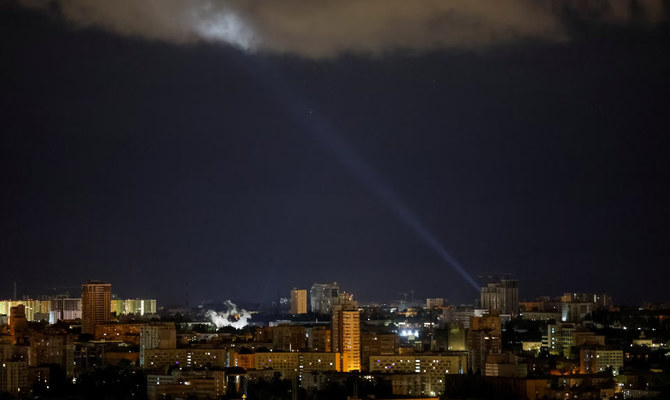
- Russia’s defense ministry said it struck Ukraine’s military-industrial complex and energy facilities in retaliation for Kyiv’s strikes on Russian energy facilities
KYIV: Russian missiles and drones struck nearly a dozen Ukrainian energy infrastructure facilities on Wednesday, causing serious damage at three Soviet-era thermal power plants and blackouts in multiple regions, officials said.
Ukraine’s air force said it shot down 39 of 55 missiles and 20 of 21 attack drones used for the attack, which piles more pressure on the energy system more than two years after Russia launched its full-scale invasion.
“Another massive attack on our energy industry!” Energy Minister German Galushchenko wrote on the Telegram app.
Two people were injured in the Kyiv region and one was hurt in the Kirovohrad region, Interior Minister Ihor Klymenko said.
Galushchenko said power generation and transmission facilities in the Poltava, Kirovohrad, Zaporizhzhia, Lviv, Ivano-Frankivsk and Vinnytsia regions were targeted.
Some 350 rescuers raced to minimize the damage to energy facilities, 30 homes, public transport vehicles, cars, and a fire station, the interior ministry said.
National power grid operator Ukrenergo said it was forced to introduce electricity cuts in nine regions for consumers and that it would expand them nationwide for businesses during peak evening hours until 11 p.m. (2000 GMT).
Ukrenergo CEO Volodymyr Kudrytskyi, interviewed by the Ukrainska Pravda media outlet, said electricity imports would not make up for power shortages. He said hydropower stations had also been hit, clarifying an earlier company statement omitting hydro stations from the list of affected facilities.
Power cuts for industrial users, he said, were “almost guaranteed” but interruptions for domestic users would depend on how well they reduced consumption.
“Many important power stations were damaged,” he said, citing three stations operated by DTEK, Ukraine’s biggest private company, as well as two hydropower stations.
“The damage is on quite a large scale. There is a significant loss of generating power, so significant that even imports of power from Europe will not cover the shortage that has been created in the energy system.”
Russia’s defense ministry said it struck Ukraine’s military-industrial complex and energy facilities in retaliation for Kyiv’s strikes on Russian energy facilities.
“As a result of the strike, Ukraine’s capabilities for the output of military products, as well as the transfer of Western weapons and military equipment to the line of contact, have been significantly reduced,” the ministry said.
WORLD WAR TWO ANNIVERSARY
President Volodymyr Zelensky noted the attacks were launched on the day Ukraine marks the end of World War Two.
“This is how the Kremlin marks the end of World War Two in Europe, with a massive strike, attempting to disrupt the lives of our people with its Nazism,” he said in his nightly video address.
In an earlier online address, Zelensky singled out what he said was the West’s limited progress in curbing Russian energy revenue and some countries that attended President Vladimir Putin’s inauguration for a fifth term in the Kremlin on Tuesday.
Fighting Nazism back then, he said, was “when humanity unites, opposes Hitler, instead of buying his oil and coming to his inauguration.”
Ukraine has stepped up drone attacks on Russian refineries this year despite apparent objections by the United States, trying to find a pressure point against the Kremlin whose forces are slowly advancing in the eastern Donbas region.
Ukrainian strikes on Russian refineries may have disrupted more than 15 percent of Russian oil refining capacity, a NATO military alliance official has said.
After pounding the energy system in the first winter of the war, Russia renewed its assault on the grid in March as Ukraine was running low on stocks of Western air defense missiles.
Prime Minister Denys Shmyhal estimated that more than 800 heating facilities had been damaged and up to 8 GW of power generation lost so far, adding the government needed $1 billion to fund repair work.
DTEK vowed to keep working to restore power at its facilities, and its CEO, Maxim Timchenko, called on Ukraine’s allies to provide more air defense systems.
Officials did not name the facilities hit on Wednesday, part of a policy of wartime secrecy that Kyiv says is needed to prevent Russia using the information for further strikes.
But Lviv governor Maksym Kozytskyi said Russia attacked a natural gas storage facility in his region in the west of the country, Radio Free Europe/Radio Liberty reported.
In central Poltava region, energy infrastructure was hit by a drone, Poltava Regional Governor Filip Pronin said.
The governors of Vinnytsia and Zaporizhzhia said critical civilian infrastructure facilities were damaged.
Armenia’s prime minister in Russia for talks amid strain in ties
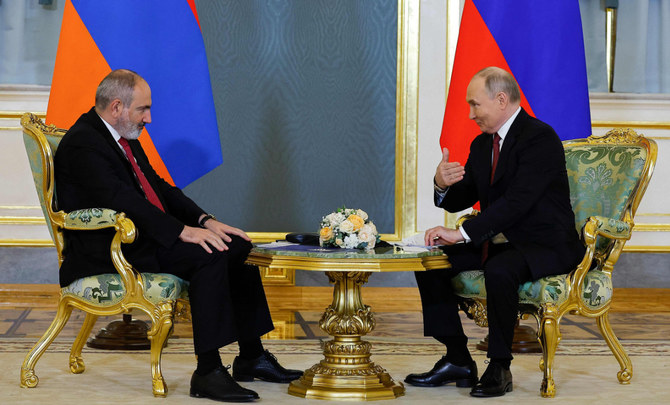
- Putin hosted Nikol Pashinyan for talks following a summit of the Eurasian Economic Union, a Moscow-dominated economic alliance
- Armenia’s ties with its longtime sponsor and ally Russia have grown increasingly strained after Azerbaijan waged a lightning military campaign in September to reclaim the Karabakh region
MOSCOW: Armenia’s prime minister visited Moscow and held talks Wednesday with Russian President Vladimir Putin amid spiraling tensions between the estranged allies.
Putin hosted Nikol Pashinyan for talks following a summit of the Eurasian Economic Union, a Moscow-dominated economic alliance. that they both attended earlier in the day. The negotiations came a day after Putin began his fifth term at a glittering Kremlin inauguration.
In brief remarks at the start of the talks, Putin said that bilateral trade was growing, but acknowledged “some issues concerning security in the region.”
Pashinyan, who last visited Moscow in December, said that “certain issues have piled up since then.”
Armenia’s ties with its longtime sponsor and ally Russia have grown increasingly strained after Azerbaijan waged a lightning military campaign in September to reclaim the Karabakh region, ending three decades of ethnic Armenian separatists’ rule there.
Armenian authorities accused Russian peacekeepers who were deployed to Nagorno-Karabakh after the previous round of hostilities in 2020 of failing to stop Azerbaijan’s onslaught. Moscow, which has a military base in Armenia, has rejected the accusations, arguing that its troops didn’t have a mandate to intervene.
The Kremlin, in turn, has been angered by Pashinyan’s efforts to deepen ties with the West and distance his country from Moscow-dominated security and economic alliances.
Just as Pashinyan was visiting Moscow on Wednesday, Armenia’s Foreign Ministry announced that the country will stop paying fees to the Collective Security Treaty Organization, a Russia-dominated security pact. Armenia has previously suspended its participation in the grouping as Pashinyan has sought to bolster ties with the European Union and NATO.
Russia was also vexed by Armenia’s decision to join the International Criminal Court, which last year indicted Putin for alleged war crimes connected to the Russian action in Ukraine.
Moscow, busy with the Ukrainian conflict that has dragged into a third year, has publicly voiced concern about Yerevan’s westward shift but sought to downplay the differences.
Kremlin spokesman Dmitry Peskov conceded Tuesday that “there are certain problems in our bilateral relations,” but added that “there is a political will to continue the dialogue.”


